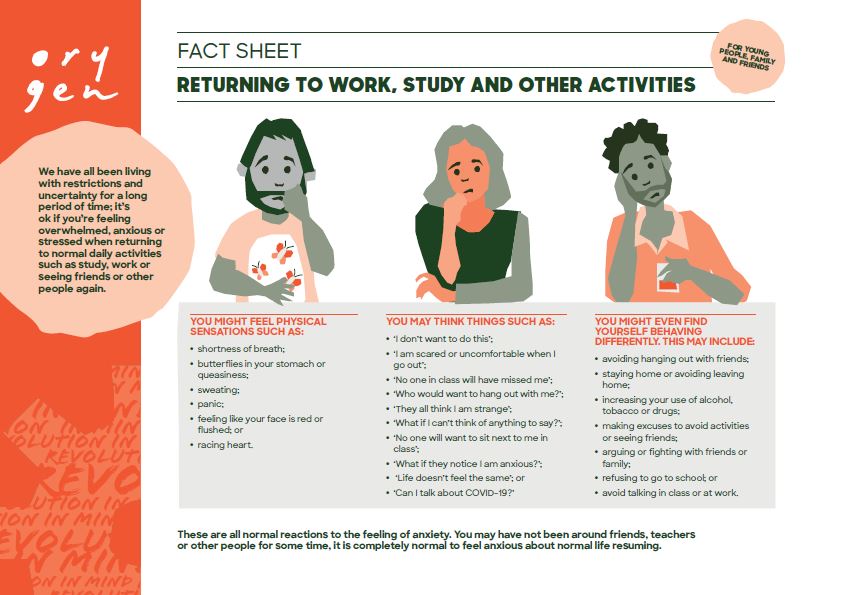Returning to work, study and other activities
We have all been living with restrictions and uncertainty for a long period of time; it’s ok if you’re feeling overwhelmed, anxious or stressed when returning to normal daily activities such as study, work or seeing friends or other people again.
You might feel physical sensations such as:
- shortness of breath;
- butterflies in your stomach or queasiness;
- sweating;
- panic;
- feeling like your face is red or flushed; or
- racing heart.
You may think things such as:
- ‘I don’t want to do this’;
- ‘I am scared or uncomfortable when I go out’;
- ‘No one in class will have missed me’;
- ‘Who would want to hang out with me?’;
- ‘They all think I am strange’;
- ‘What if I can’t think of anything to say?’;
- ‘No one will want to sit next to me in class’;
- ‘What if they notice I am anxious?’;
- ‘Life doesn’t feel the same’; or
- ‘Can I talk about COVID-19?’.
You might even find yourself behaving differently. This may include:
- avoiding hanging out with friends;
- staying home or avoiding leaving home;
- increasing your use of alcohol, tobacco or drugs;
- making excuses to avoid activities or seeing friends;
- arguing or fighting with friends or family;
- refusing to go to school; or
- avoid talking in class or at work.
These are all normal reactions to the feeling of anxiety. You may have not been around friends, teachers or other people for some time, it is completely normal to feel anxious about normal life resuming.
Take small steps
If you’re feeling anxious about life not being the same as it was before the COVID-19 outbreak. Try to take small steps and do something that doesn’t feel as scary for you. For example, if you are feeling anxious about returning to school, start walking past school a few days before you return or ask to meet a friend you trust to walk to school together.
Address negative thoughts
Negative thoughts are a common feature of anxiety in social situations. Try and remind yourself that many other people are also feeling the same and will also be feeling anxious in similar ways or having similar thoughts.
Name your feelings
When people feel anxious, it is normal to try to avoid the unpleasant physical sensations (e.g. butterflies in your stomach, panic, shortness of breath, etc.). Anxiety is a normal emotion, just like all the other emotions we have every day. It is ok to name anxiety as we all feel it. By talking about anxiety, it sometimes loses its power over you.
Find strategies that work for you
Use music if it helps, put your headphones on when you are going to school or in between classes. Taking small walks around the block might help also.
Whilst these strategies may help initially, it is important to avoid relying on them in the long-term. For example, start off slowly but try and build up more independence as you go. If you trust one friend to support you to get to school, ask that friend to be with you for the first week or two but then try to go on your own or with a different friend as you get more used to being out. Take very small steps to ease yourself gradually into life and ask your school, workplace, TAFE or university to support you in your return.
Set goals to build up your confidence
It’s really common for people to find strategies that might help to reduce those uncomfortable feelings of anxiety, such as avoiding the tasks or situations that cause feelings of anxiety. However, this can sometimes result in people feeling worse about themselves and being unable to perform the tasks that are important to them.
Everyone will need a different approach to feeling confident to do tasks they haven’t performed for a while. Some may benefit from a relaxed approach and set one to two goals in the lead up to performing the task itself. Others may benefit from clear goals set each day – you can imagine it to be a bit like a step ladder towards the final goal, so that every task you do becomes more complex or might initially cause you a bit more anxiety.
If you are feeling particularly vulnerable, enlisting another person (such as a parent) can be helpful to set goals. They can also act as a prompt to encourage you to follow through with these daily tasks. If you find yourself getting stuck, you can reassess these goals together. Don’t forget to celebrate the things that you achieve together too!
Talk to people you trust
Remember, adjusting back to our lives is something we are all doing together. Sharing our thoughts and feelings in a safe space will help normalise what we are going through. If this doesn’t help seek help from a parent/carer, teacher or someone you trust.
Seek information and support
Look for information about anxiety online. People in your support network might be able to help you with this.
If it’s available to you, you could also see your GP or mental health professional for extra help (but make sure to follow the advice of healthdirect if you’re showing symptoms or are in self-isolation).
 Download these tips
Download these tips